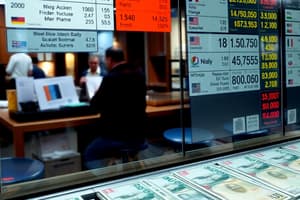Podcast
Questions and Answers
What is an exchange rate?
What is an exchange rate?
How does a trade surplus impact a country's currency?
How does a trade surplus impact a country's currency?
Which factor contributes to weakening a country's currency?
Which factor contributes to weakening a country's currency?
What does the balance of payments represent?
What does the balance of payments represent?
Signup and view all the answers
Which economic indicators can affect exchange rates?
Which economic indicators can affect exchange rates?
Signup and view all the answers
How do higher interest rates affect a country's currency value?
How do higher interest rates affect a country's currency value?
Signup and view all the answers
What impact does a lower exchange rate have on a country's exports?
What impact does a lower exchange rate have on a country's exports?
Signup and view all the answers
How do exchange rates influence investments in foreign assets?
How do exchange rates influence investments in foreign assets?
Signup and view all the answers
What role do economic indicators play in determining exchange rates?
What role do economic indicators play in determining exchange rates?
Signup and view all the answers
Why is understanding exchange rates important for those involved in international business?
Why is understanding exchange rates important for those involved in international business?
Signup and view all the answers
Study Notes
Introduction
Exchange rates refer to the rate at which one currency can be exchanged for another. They are influenced by numerous factors, including economic indicators like inflation rates, interest rates, and employment figures. In this article, we will delve into the intricacies of exchange rates, their components, and how they affect international trade and investments.
Understanding Exchange Rates
At its core, an exchange rate is simply the value of one country's currency relative to another. For example, if the exchange rate between the US dollar (USD) and the euro (EUR) is 1.25, it means that 1 EUR is equivalent to $1.25 USD. The exchange rates between all currencies are typically calculated continuously, and these rates can change frequently, depending on market conditions.
Components of Exchange Rates
The value of a currency is determined by the balance of payments, which is a record of all international transactions between a country and the rest of the world. A country's balance of trade is the difference between its exports and imports. If a country exports more than it imports, it has a trade surplus, which tends to strengthen the currency. On the other hand, a trade deficit, where a country imports more than it exports, tends to weaken the currency.
However, exchange rates are not only determined by a country's balance of trade. They are also affected by interest rates, inflation rates, economic growth, and other economic indicators. Interest rates, in particular, play a significant role in determining exchange rates. Higher interest rates make a currency more attractive to investors, which can increase its value.
Exchange Rates and International Trade
Exchange rates play a crucial role in international trade. They influence the competitiveness of a country's exports and the cost of imported goods. A lower exchange rate makes a country's exports cheaper for foreign buyers, making them more competitive in international markets. Conversely, a higher exchange rate makes a country's exports more expensive, which can decrease their competitiveness.
Exchange Rates and Investments
Exchange rates also affect investments. When investing in foreign assets, the exchange rate between the investor's home currency and the currency of the country where the asset is located plays a crucial role in determining the potential return on investment. For example, if an investor from the US buys a stock in a European company, the exchange rate between the USD and the euro will determine the return on their investment, as the dividends paid by the company will be in euros.
Conclusion
In conclusion, exchange rates are a critical aspect of the global economy, influencing international trade and investments. They are determined by various factors, including economic indicators and the balance of payments between countries. Understanding exchange rates is essential for anyone involved in international business or investing, as it helps to predict market trends and make informed decisions.
Studying That Suits You
Use AI to generate personalized quizzes and flashcards to suit your learning preferences.
Description
Explore the complexities of exchange rates, including their components and how they impact international trade and investments. Learn about the factors influencing exchange rates such as interest rates, inflation rates, and balance of payments.




